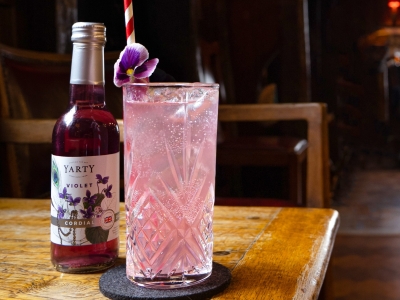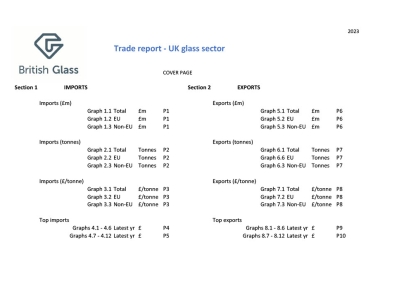Enviroglass Melting – a research project supported by the British Glass’ Energy and Environment Committee – is calling for input from industry to help it transform waste, such as banana skins and seashells, into an economically and environmentally viable model for sustainable glass production.
Melting raw materials accounts 70% the energy use and carbon emissions of glass manufacturing. That’s why Glass Technology Services and Sheffield Hallam University are combining their knowledge and expertise to identify and trial different raw material mixes that allow glass to melt at a lower temperature, requiring less energy.
This one-year research project is funded by a grant of £156k from the Innovate UK Energy Catalyst fund as well as financial support from the British Glass Energy and Environment (E&E) Committee. Rob Ireson, who is leading the GTS Ltd project team and presented on the work as part of last BG E&E Committee meeting, explained:
“If glass manufacturers could operate furnaces at a lower temperature – and make glass of the same quality – we estimate the UK glass industry could reduce its energy consumption by 5-10%. That could equate to a direct energy cost saving of between £3.5million and £7million a year for UK glass manufacturers as well as a CO2 saving of around 200,000 tonnes a year. That would be an important contribution to the glass industry meeting its CO2 reduction targets.”
The Enviroglass Melting project has three strands:
-
Exploring the chemical reformulation of glass to allow lower temperature or faster melting by modifying the batch mix.
-
Identifying mineral-rich, industrial-scale waste streams that could replace virgin raw materials – possibilities include food production, mining and chemical process wastes.
-
Using waste heat from glass manufacture to process, purify and treat these waste materials – to avoid cancelling-out the energy saving achieved by altering the melting temperature/speed.
Enviroglass Melting is one of a number of projects working in this area around the world. For example recent work in the Netherlands discovered a way to use waste lime pellets from water treatment as a raw material for glass; these are now being used on a commercial scale by the Ardagh Group.
British Glass, with its E&E Committee and the wider membership, has played a key role in the Energy Efficiency and Decarbonisation Roadmaps 2050 – a government initiative working alongside energy intensive industries to create sector-specific voluntary action plans for reducing CO2. The E&E Committee’s financial support of this project underlines the glass sector’s commitment to making its manufacturing economically and environmentally sustainable.
An important aspect of the Enviroglass Melting project is that it is looking beyond the technical possibilities to build an economic model. Rob Ireson said:
“Our investigation will encompass the wider process and account for the nature, availability and geographical spread of waste streams – and the energy involved in transporting and processing them. We want to be able to give manufacturers an accurate forecast of potential savings so that they can make commercially robust decisions about a particular reformulation.”
Of course, building such an economic model will demand close collaboration with industry to understand the potential barriers to adopting new waste streams and also the level of technical and financial evidence companies would need to consider taking trials to a commercial level. That’s why the Enviroglass Melting team is keen to talk to interested companies individually. Rob explained:
“We want to have informal conversations at this stage – gauging initial thoughts, barriers and needs. But building a business case to secure further Government funding for the glass industry to scale-up the technology is central to this project – so who knows where those conversations could lead.”
Valli Murthy, British Glass’ environmental adviser, said:
“Research and development of win-win solutions is central to the UK glass decarbonisation roadmap, and the British Glass Energy and Environment committee have shown leadership by supporting this pre-competitive project. I urge interested companies to get in touch and help shape the work, and increase the chance of finding a raw material that may be of particular use to their company.”
Want to help shape the research?
The Enviroglass Melting team wants to talk technical leads in the glass manufacturing supply chain to discuss the following questions.
-
What do you see as the major barriers to implementing new raw material streams into the production process?
-
What sources of waste heat might be accessible to pre-process raw materials?
-
What technical and commercial evidence would be most useful to secure industry partners for the next stage of the development process and potential commercial trials?
To find out more or set up an initial conversations email Rob Ireson via enquiries@glass-ts.com
Notes
The Enviroglass Melting project is lead by Glass Technology Services Ltd and Sheffield Hallam University’s Materials and Engineering Research Institute. It will run until June 2017.
www.shu.ac.uk/research/specialisms/materials-and-engineering-research-institute
To find out more, email Rob Ireson via enquiries@glass-ts.com
The project is funded by Innovate UK’s Energy Catalyst programme. Innovate UK is the UK’s innovation agency. It works with people, companies and partner organisations to find and drive the science and technology innovations that will grow the UK economy. For further information visit www.innovateuk.gov.uk


